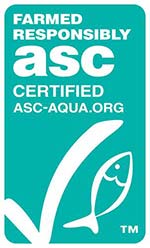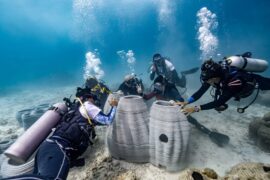Netuno Internacional has become the first fish farm in Brazil to receive Aquaculture Stewardship Council (ASC) certification. After an independent, third-party assessment conducted by Control Union Peru, it was awarded ASC certification against the tilapia standard.
The achievement comes in the lead-up to the 2016 Rio Olympic and Paralympic games. The Rio 2016 organizing committee has made a commitment to supply ASC- and Marine Stewardship Council (MSC)-certified seafood to athletes and spectators at the games whenever possible. The pledge is part of a broader push by Rio 2016 to leave a lasting, positive legacy on the region. ASC certification means that Netuno can play a key role in providing responsibly sourced fish in some of the estimated 14 million meals to be served during the Olympic games, an operation that has been described as the largest peacetime catering enterprise in the world.
“We are very excited to be able to offer the first certified responsible seafood from Brazil,” said Andre M. Brugger, vice president of the Brazilian Institute for Sustainable Development (IABS) and sustainability advisor to Netuno.
 “Netuno Internacional is to be congratulated on this achievement,” said Chris Ninnes, ASC’s chief executive officer. “Its certification is an important first in Brazil, and we are pleased to welcome them to the program. They have set a high standard for their operations and are further proof that what is good for the environment, workers and the community is also good for business. Of course, with the Olympics on the horizon, Netuno’s certification also sets a great example for how local producers can represent their country by offering responsibly farmed seafood to a global audience.”
“Netuno Internacional is to be congratulated on this achievement,” said Chris Ninnes, ASC’s chief executive officer. “Its certification is an important first in Brazil, and we are pleased to welcome them to the program. They have set a high standard for their operations and are further proof that what is good for the environment, workers and the community is also good for business. Of course, with the Olympics on the horizon, Netuno’s certification also sets a great example for how local producers can represent their country by offering responsibly farmed seafood to a global audience.”
Situated just outside the city of Paulo Afanso in Bahia, Brazil, Netuno is a leader in the production and export of seafood around the world. In order to become ASC certified, the farm undertook preparation activities including training staff members to record critical data such as the rate of escapes, predator casualties and calculated their phosphorous and nitrogen footprint.
Netuno believes that ASC certification and the opportunities it brings will provide new possibilities for the communities in northeast Brazil that have previously lacked access to other forms of agriculture due to conditions in the area. According to Brugger, “Aquaculture is one of the best options for this region if done under rigid sustainable criteria like the ones that ASC applies.”
The IABS president added: “We are most proud of the great interaction that we have with the community. The water quality of the lake on which we have operations – 11 billion cubic meters of lake with 1,200 cubic meters renovation per second – and the fact that we do not use any chemicals or antibiotics in any of our supply chain helps us maintain positive relationships with residents and those we share the lake with.”
 The ASC promotes responsibly farmed seafood by working together with its partners to help guide the industry towards an environmentally sustainable and socially responsible future through a certification and labeling program. Its farm standards were developed by more than 2,000 stakeholders globally and adhere to ISEAL’s Code of Good Practice for Setting Social and Environmental Standards.
The ASC promotes responsibly farmed seafood by working together with its partners to help guide the industry towards an environmentally sustainable and socially responsible future through a certification and labeling program. Its farm standards were developed by more than 2,000 stakeholders globally and adhere to ISEAL’s Code of Good Practice for Setting Social and Environmental Standards.
The ASC tilapia standard focus is on both the environmental and social impacts associated with poorly managed tilapia farming. Common issues are minimized through globally applied standards that address the key impact of farm operations on local ecosystems, biodiversity, and local communities. Farms in the program must also have a plan in place to avoid and appropriately address disease outbreaks and processes that minimize escapes, including catching devices installed to recapture any fish that might slip away from enclosed areas.
The program requires tilapia farms to adhere to strict limits on the use of wild fish as an ingredient for feed and also requires them to record various water parameters including nitrogen, phosphorus and oxygen levels at regular intervals to ensure they remain within set limits.





